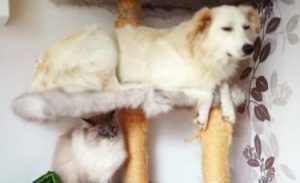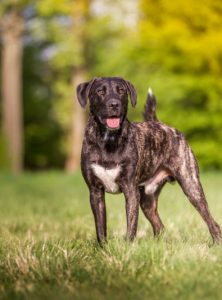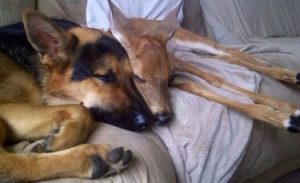Other names: Hollandse Herdershond, Dutch Shepherd
The Dutch Shepherd has little touches of German Shepherd in him. He comes down, that helps. Its physical and psychological characteristics are similar. Dog of medium size, enduring, with a powerful and well-proportioned constitution, the Dutch Shepherd displays an expression full of intelligence and liveliness. Watchdog par excellence, the Dutch Shepherd is gentle, caring, faithful, loyal to his master and all of his family. He is sometimes a pot-de-glue. There are three varieties in this breed, depending on the type of coat: short, long and harsh.
<!–
–>
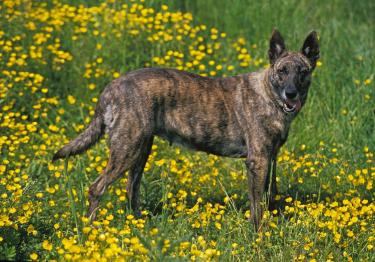
| Half-long | |
| Netherlands | |
| Big | |
| Long |
| Sex | Weight | Cut |
|---|---|---|
| Female | From 20 kg to 30 kg | From 55 cm to 60 cm |
| Male | From 24 kg to 32 kg | From 55 cm to 62 cm |
History of the breed
Close cousin of the Belgian Shepherd, the Dutch Shepherd was the delight of Dutch shepherds who found there a first choice working partner. The Dutch Shepherd quickly established himself as a versatile working dog: he was able to lead herds, protect them, watch backyard animals, pull carts and stand guard. It is said to be the result of a cross between the German Shepherd and Dutch Shepherd dogs .
From the beginning of the 20th century, he gradually converted into a companion and guard dog thanks to his many qualities. The Dutch Shepherd Dog is also employed by certain police or army brigades . It remains relatively little known outside the Netherlands, in comparison with the Belgian Shepherd and the German Shepherd, for example. The first breed standard dates from June 12, 1898. The one currently in force was established on July 28, 2009.
Dutch Shepherd Pictures
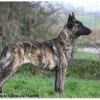
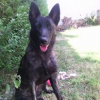
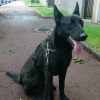
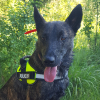
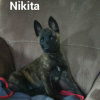
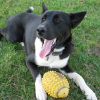
View all Dutch Shepherd photos of Woopets members
Physical features
Its coat: In the short-haired variety, the coat is very hard, tight, with a woolly undercoat. In the long-haired one, it is straight, lying and rough to the touch, with a woolly undercoat. In the wire-haired variety, the coat is very thick and tousled, with a woolly undercoat except on the head.
Its color: brindle, on a golden background color (light sand to chestnut red) or silver. The brindle also extends to the ruff, panties and tail.
His head: proportioned to the body, long, dry and without wrinkles. The skull is flat and the stop is light, but present.
His ears: medium in size, carried very high and erect when the dog is in action or awake.
His eyes: medium in size, almond shaped, slightly oblique and dark in color.
His body: solid and of harmonious construction. The back is straight and robust, the croup is slightly swallowed, but not short, the chest is deep and the ribs slightly arched.
Its tail: hangs straight or bends slightly at rest, reaching the point of the hock. Raised in action.
Behavior and character
| Affectionate | |
|---|---|
| Calm | |
| Protective | |
| Independent | |
| Hunter | |
| Barks / howls |
Behavior with others
| Cohabitation with children | |
|---|---|
| Sociable with other animals | |
| Love strangers |
The Dutch Shepherd is an intelligent, hardworking, extremely loyal, totally reliable, vigilant and very attentive dog. In short, he is the shepherd dog par excellence, which also gets along wonderfully with his fellow creatures who are also destined to guard and guide the flocks. The Dutch Shepherd is also a very good companion and guard dog who has a strong sense of territory.
It is obviously protective , and particularly enduring . He descends straight from the German Shepherd who has the same qualities: courageous, dynamic, lively . Like the latter, the Dutch Shepherd Dog is the perfect playmate for children, which he will take care to watch out for in all situations. He will thus be considerate and attentive to their slightest deed or gesture. He is autonomous and not independent, and knows how to take initiatives .
The Dutch Shepherd
is it right for you? Take the test!
Education
| Clever | |
|---|---|
| Obedient |
Active and intelligent, the Dutch Shepherd must be educated in a fair way, without excess . It should not be spoiled or punished. He also needs to be socialized like any breed, even if he is naturally close to other dogs and animals in general . Thanks to the game thanks to which good deeds will be associated with positive things, the Dutch Shepherd puppy will quickly learn the rules to follow and the limits not to be exceeded.
Living conditions
| Suitable for apartment living | |
|---|---|
| Good for new masters | |
| Love it hot | |
| Love the cold |
If he is called to live in an apartment, the Dutch Shepherd must be walked for a long time, because he is more suited to live in outdoor spaces . Due to his past as a sheepdog, he needs a lot of freedom of movement. A house with a garden would therefore suit him perfectly. The ideal living environment for this dog is the countryside. He will not leave his master for the world and could even find himself glue at times. So there is no need to leave him outside for a whole day. He will like the comfort of the interior, as long as his master is nearby.
Health
| Solid | |
|---|---|
| Ease of gaining weight |
The Dutch Shepherd is a rather robust dog. He does not present any particular health problem , apart from, of course, a risk of hip dysplasia for various breeds of medium and large sizes. His diet should be watched, because this dog should especially not be bulky.
Hypoallergenic breed
No
Litter size
Between 2 and 9 puppies
To protect you from these risks and insure your companion in the event of health problems, Woopets recommends insurance for Dutch Shepherd dogs .

function showAssuranceForm () {var siteReferer = var id_race_association = ’51’; //console.log(id_race_association);success: function (html) {}});}document.addEventListener (‘DOMContentLoaded’, () => {$ (‘# assuranceModalBanner’). on (‘show.bs.modal’, function (event) {showAssuranceForm ();});});
Life expectancy
Minimum: 12 years old
Maximum: 14 years
The life expectancy of a Dutch Shepherd is, on average, between 12 years and 14 years.
Calculate the human age of your Dutch Shepherd!
To choose… 1 year 2 years 3 years Four years 5 years 6 years 7 years 8 years 9 years 10 years 11 years old 12 years 13 years 14 years old 15 years old 16 years old 17 years 18 years old 19 years old 20 years 21 years old
Maintenance and hygiene
| Ease of maintenance | |
|---|---|
| Cost of maintenance | |
| Hair loss |
| Drool level | |
|---|---|
| Ease of grooming |
The short-haired or wire-haired Dutch Shepherd does not require a lot of maintenance . The long-haired variety, on the other hand, needs to be groomed more often, especially during molts.
It is recommended to brush the dog at a regular rate , especially in the long-haired variety which must be brushed daily. Grooming is not necessary if properly maintained.
Price and budget
Purchase price
Mini
Max € 500
1000 €
The purchase price of a Dutch Shepherd is between 500 € and 1000 €.
Annual maintenance cost
Mini
€ 1300 Maxi
1400 €
The annual maintenance cost of a Dutch Shepherd is between 1300 € and 1400 €.
No name is currently proposed. Use our tool to find the name of your Dutch Shepherd!
Food
The Dutch Shepherd is ideal in terms of food. He doesn’t eat too much and doesn’t want to be picky. Thus, his diet must be balanced and healthy to avoid any overweight to which he is subject. A diet based on high quality croquettes . It can be added a little meat , which he loves.
Want the best for your dog?
Create the tailor-made diet for your Dutch Shepherd
I discover !
PROMO -30% | Delivered to you!

Physical activity
| Athletic | |
|---|---|
| Energy level | |
| Potential to play |
The Dutch Shepherd must be able to walk daily . He needs to run, jump and stay active , hence the need to offer him various games during outings. Crossing obstacles and fetching balls allow him to exploit all his liveliness and express his potential.
Competitions
| Classifications & Standards |
|
Others
| Master character <span class="btnTooltip qTip2" title="- Calm: the master must be gentle and know how to show patience. – Active: the owner must be energetic and dynamic to live in harmony with his dog. – Hyperactive: the owner must be stimulating and very restless to suit the temperament of his dog.”> |
Calm |
|---|
We talk on the forum
Weight and measurements: Malinois Shepherd and Dutch Shepherd
Message from Fouad Bouregba
Shetland Shepherd or Australian Shepherd
Guest message
Australian Shepherd, “SHEPHERD” / genetic problem
Message from Cindy & Oreo
The white shepherd, a sensitive dog?
Message from alison
why people are afraid of the german shepherd
Message from djo27
Do you have a question about the Dutch Shepherd?
Do not hesitate to ask Woopets visitors for advice on the forum!
FCI Information
FCI No.
223
FCI Group
Group 1: Sheepdogs and Cattle Dogs (except Swiss Cattle Dogs)
Recognized by FCI
Since 1955
</div


